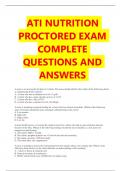Presentation
Computer basics
- Course
- Computer literacy
- Institution
- University Of Johannesburg (UJ)
**Computer Basics Guide:** **Purpose:** A document that serves as an introductory guide to computer fundamentals, designed for individuals new to computing or seeking a refresher on essential concepts. **Key Topics Covered:** 1. **Hardware Components:** Explanation of key hardware componen...
[Show more]





